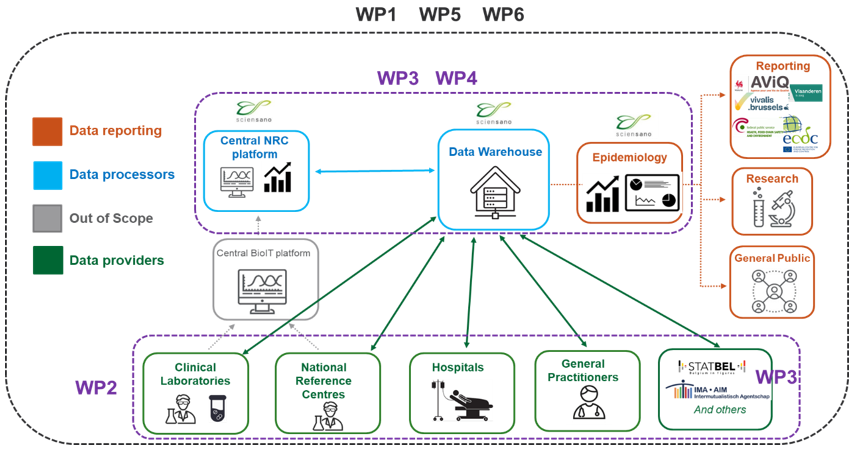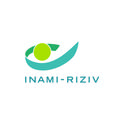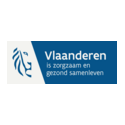In short
The BE-SURVID project strengthens infectious disease surveillance in Belgium by enhancing digital surveillance systems at the general practitioner (GP), clinical laboratory, and hospital levels. Additionally, linking surveillance data with other key health datasets will improve the monitoring, investigation, and control of infectious diseases, ensuring Belgium is better prepared for emerging pathogens and future health threats.
Project description
BE-SURVID, Strengthening Surveillance for Better Health
Surveillance systems at different levels of the healthcare system (hospitals, laboratories, nursing homes, primary care) are essential for monitoring the emergence and impact of infectious diseases. The COVID-19 pandemic highlighted the need for continuous, automated surveillance mechanisms that can rapidly integrate emerging pathogens to strengthen preparedness and response capabilities. The BE-SURVID project builds on these lessons to further establish integrated infectious disease surveillance systems in Belgium during the period 2025-2029. Developed in collaboration with regional and national stakeholders, the project is aligned with European Union guidelines and initiatives to strengthen the national surveillance infrastructure.
The project is structured in six interrelated work packages (WPs):
- WP1: Coordination, Communication, and Dissemination | Ensuring effective project management, stakeholder engagement, and dissemination of results to support evidence-based public health policy.
- WP2: Digitalised surveillance | Implementing automated system-to-system data transfer and enabling secondary use of electronic health records from general practitioners, laboratories, and hospitals to improve real-time surveillance of infectious diseases.
- WP3: Integrated surveillance | Establishing links between surveillance data and external data sets to improve infectious disease surveillance (see project page EPI-LINK).
- WP4: Signal Detection & Modelling | Development of automated outbreak detection tools and predictive models to identify emerging infectious disease threats and support timely intervention strategies.
- WP5: Data Governance | Identifying a legal and technical governance framework for infectious disease surveillance, ensuring GDPR compliance and alignment with initiatives such as the Belgian Health Data Authority and the European Health Data Space.
- WP6: Sustainability and Evaluation | Assessing the long-term impact, feasibility, and scalability of the surveillance systems to ensure continued effectiveness beyond the duration of the project.
Rather than focusing on a single surveillance system, BE-SURVID aims to promote the digitalization and interoperability of multiple surveillance networks, recognizing their strategic importance for public health. While strengthening surveillance for respiratory infections is a key focus, the project also includes targeted actions for high-priority infectious diseases, such as improved surveillance for HIV and tick-borne infections. By supporting continuous digitalized data collection, data integration, automated analysis, and a sustainable surveillance infrastructure, BE-SURVID will contribute to a strong and resilient infectious disease surveillance system in Belgium.
The high-level design of BE-SURVID
The BE-SURVID project builds on the be.Prepared architecture to provide a comprehensive surveillance framework. This infrastructure outlines the data architecture, key infrastructures, and data flows between different components. A high-level overview of this landscape is presented below.

Figure 1: An overview of the BE-SURVID landscape. This figure illustrates the different work packages related to data providers (bottom), data processing (center), and data reporting activities (right), structured within the be.Prepared architecture. WP2 and WP3 facilitate data reporting by providers and ensure secure pseudonymized linkage within a centralized data warehouse hosted by healthdata.be. This integrated system will support data reporting, signal detection, and modelling activities (WP4). Data from different providers will be systematically collected and processed. The broader work packages like WP1 (Coordination, Communication, and Dissemination), WP5 (data governance), and WP6 (Sustainability and Evaluation) provide essential support for the successful implementation and long-term impact of the surveillance framework.
List of project members
This project is made possible by the unwavering commitment of all the people below:
- Service of Epidemiology of Infectious Diseases, Sciensano
-
- Heleen Masset (Lead WP1, WP2 and WP6 — Project Manager)
- Dieter Van Cauteren (Lead WP1 and Support WP2)
- Amber Van Laer (Lead WP1 and WP6)
- Laurane De Mot (Support WP2 and WP4: responsible for Respiratory infections)
- Yinthe Dockx (Support WP2 and WP4: responsible for Respiratory infections)
- Joris Van Loenhout (WP3 Lead)
- Veerle Stouten (Support WP2: responsible for Epilabo and support WP3: EPI-LINK)
- Finaba Berete (Support WP3: responsible for EPI-LINK and support WP2: Epilabo)
- Natalia Bustos Sierra (Support WP3: responsible for Mortality)
- Serge Nganda (Support WP3: responsible for Mortality)
- Catharina Vernemmen (Support WP3: responsible for Mortality)
- Ruben Brondeel (WP4 Lead, Support WP1)
- Frederik De Keersmaeker (Support WP4: responsible for Signal detection and Modelling)
- Elias Vermeiren (Support WP4: responsible for Signal Detection)
- Raphaël Rousseau (Support WP4: responsible for Tick-borne infections)
- Tinne Lernout: (Support WP4: responsible for Tick-borne infections)
- Laurence Geebelen (Support WP4: responsible for Tick-borne infections)
- Simon Couvreur (Support WP2 and WP4)
- Toon Braeye (Support WP3 and WP4)
- Jessika Deblonde (Support WP3 and WP4: responsible for HIV)
- Dominique Van Beckhoven (Support WP3 and WP4: responsible for HIV)
- Ben Serrien (Support WP3 and WP4: responsible for HIV)
- Pierre Hubin (WP5 Lead)
- Eva Verdonck (Administrative support for all WPs)
- Koen Blot (Head of Service Epidemiology of Infectious Diseases)
- Karin De Ridder (Scientific Director Epidemiology and Public Health)
- Service of Health Service Research
-
- Nathalie Bossuyt (Support WP2: responsible for GP Barometer)
- Robrecht de Schreye (Head of Service Health Services Research)
- Service of Healthdata.be
-
- Luc Maes (Data Protection Officer)
- Kim Luyckx (Support WP2)
- Sofie Debroe (Scientific Director Strategy and External Positioning and Healthdata.be
- Service of Budget and Management Control
-
- Mathieu Brabant (Financial support)
- Mathieu Ronval (Financial support)
- Lina Ouberri (Financial support)
- Marie-Sophie Croenne (Head of Service Budget and Management Control)
Results
- On 28.01.2025, a “kick-off meeting” was held to officially launch BE-SURVID and initiate its activities. Please find the presentation here
- On 11.03.2025, a “pitch presentation” was given on Sciensano’s EpiTuesday. Please find the presentation here
- On 10.04.2025, the project was introduced at the international “Inception Conference” in Luxembourg. Please find the presentation here
- On 22.05.2025, the Symposium on Diagnostic and Surveillance of infectious diseases occurred in Brussels. Please find the scientific poster entitled “Strengthening Surveillance of Infectious Diseases in Belgium | BE-SURVID: From COVID-19 to any other pathogen” here
The project BE-SURVID is granted by the European Commission under the EU4Health Programme (action EU4H-2023-DGA-MS-IBA-01) with the Grant Agreement no. 101183131. Views and opinions expressed are those of the author(s) only and do not necessarily reflect those of the European Union or HaDEA. Neither the European Union nor the granting authority can be held responsible for them.
Sciensano's project investigator(s):
Service(s) working on this project
Partners









